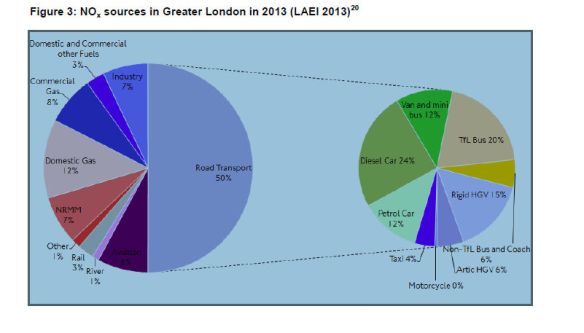The EU Commission has given the UK a final warning over air pollution in the country. That particularly covers London but also 15 other cities. Similar warnings have been given to Germany, France, Italy and Spain. There are persistent breaches of NO2 limits and the European Commission may decide to take legal action if they fail to act within two months. If not the UK could be taken to the Court of Justice of the EU, although that is one Court that will be affected by the UK departing from the EU. The UK Government is to publish a revised plan to deal with the problem in April.
Meanwhile London Mayor Sadiq Khan is not waiting for that. He has published the results of the public consultation on a new Emissions Surcharge and extensions to the Ultra Low Emission Zone (ULEZ). The proposals were covered in our last newsletter (Dec 2016) and would impose major extra costs on road users of many kinds in London. The consultation was done without any data on the likely benefits in terms of reduced pollution, and without any cost benefit analysis.
With such biased information being provided, one might expect that the result would be as the Mayor desired. Here’s a brief summary of the results (go here for the full data: https://consultations.tfl.gov.uk/environment/air-quality-consultation-phase-2/?cid=airquality-consultation ).
- From 23 Oct 2017 some older vehicles will be required to pay a surcharge of £10 to enter the Congestion Charge (a.k.a. Tax) zone. This is called the Emission Surcharge (ES or “T”-charge). They have provided a web site to enable you to check your vehicle for compliance with this and the ULEZ. This is now definitely proceeding as it was a statutory consultation. 63% of respondents supported it, with 30% opposing. Most also supported the proposed start date.
- Other consultation questions were non-statutory and there will be another consultation on these soon. One question was on the proposal for an earlier implementation of the ULEZ to 2019. This received 63% support versus 29% opposed.
- A third question was on expansion of the ULEZ to within the North and South Circular. This received support from 59% of respondents versus 34% opposed. There was similar support for bringing that in during 2019.
Lastly the latest document from TfL repeats the very dubious claim that “The equivalent of around 9,400 deaths per year in London are attributed to air quality related illnesses”. This is simply wrong and exaggerates the scientific research that has been reported. It confounds possible contributory factors with actual “causes” of death. There is probably some impact on life expectancy from living and working in higher air pollution in London, but the impact is not nearly as clear cut as that and may simply mean some shortening of life in heavily polluted areas.
Note: there are about 48,000 deaths per year from all causes in London. Not a single one has air pollution assigned as a cause of death.
For example this is contained in a report from Clean Air in London: “The Department of Health estimates Bromley (6.1%) has the lowest death rate in London attributable to air pollution and Westminster (8.3%) has the highest” but that is based simply on categorising illnesses and causes of death as being affected to a lesser or greater extent by air pollution. So lung cancer is included even though the vast majority of deaths from it are undoubtedly caused by smoking. There could of course be other reasons from the differences between Bromley and Westminster related to life styles and the demographics of the two populations.
Even if all cars were banned from London, there would still be very considerable air pollution from buses, taxis, HGVs, domestic heating, commercial activities, rail transport, etc, as you can see from the chart below.

The message though from these facts is that cleaning up the rest of London’s air to be as good as Bromley’s could only reduce the health impact of air pollution to a limited extent at best and the other demographic factors might mean there is no improvement in mortality . The cost of doing so may be outweighed by the other benefits on which money could be spent to improve the health of the community. For example on the NHS which is clearly desperately short of money as the national media keep telling us of late.
Roger Lawson
